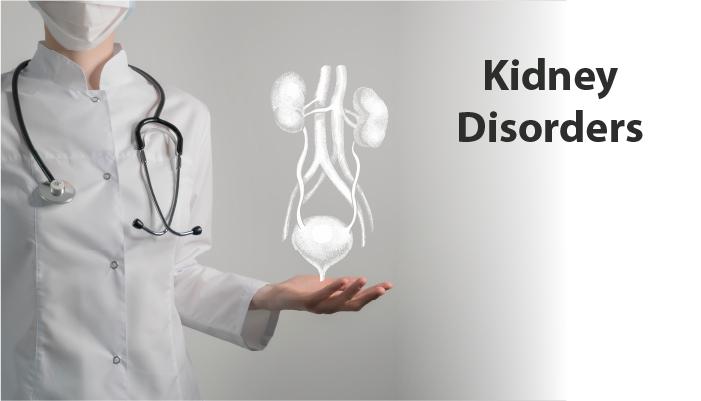Preventive Measures Against Kidney Disorders
February 15, 2023
Often, the cost and time to cure a disease are very tedious and damaging to the body; therefore, prevention is better than cure. It is not easy to treat many kidney-related disorders, so it is advisable to reduce the chances of the severity of the disease. Prolonged diabetes and high blood pressure can increase the risks of kidney-related disease, so it is necessary to monitor sugar levels and blood pressure regularly.
What are kidney-related diseases?
Kidneys are the essential organs of the excretory system and are responsible for filtering the blood and removing nitrogenous waste from the body. Various kidney-related diseases are
- Cystinosis - Cysteine build-up in the body
- Glomerulonephritis - Damage to the glomerulus
- Lupus nephritis - Auto-immune disease
- Atypical hemolytic uremic syndrome - Formation of blood clots that block the flow of blood to kidneys
- Polycystic kidney disease - Formation of cysts in the kidney
Causes of Kidney Disease
Factors increasing the risk of kidney-related diseases are as follows:
- High blood pressure
- Diabetes
- Obesity
- Smoking
- Old age
- Abnormal structure of the kidney
Symptoms of Kidney Disease
If you suffer from the following symptoms, you must contact your doctor:
- Loss of appetite
- Difficulty in urination
- Nausea and vomiting
- Itchy and dry skin
- High blood pressure
- Breathlessness
- Sleep problems
When to see a doctor
If you constantly suffer from problems related to urination, high blood pressure, dry skin, and vomiting, then you must consult a doctor. After the diagnosis, the doctors can determine the problems associated with the kidneys.
6 Golden Rules of Kidney Disease Prevention
There are various preventive measures against kidney-related diseases.
1. Diet
- You must reduce the consumption of products with added salts like fast foods, canned soups, canned vegetables, and processed meat.
- Consume food with lower potassium, like apple, carrot, cabbage, and strawberries.
- You must limit the consumption of food products with high proteins like eggs, milk, meat, and cheese.
- Reduce the consumption of sugars and saturated fats.
2. Tests
If you are suffering from high blood pressure, diabetes, or inherited kidney problems, you must undergo regular tests to know about the well-being of your kidneys.
- Urine tests - They help to measure the concentration of glucose and proteins in your urine, along with the presence of blood.
- Fasting blood glucose tests - This test measures the blood glucose level before eating for several hours.
- Haemoglobin A1C test - It measures the average blood sugar level over the last couple of months, thus helping to determine diabetes in individuals.
- Blood pressure readings - It checks whether you are suffering from high or low blood pressure or if it is in the normal range.
- Creatinine tests - These tests measure the amount of creatinine in the body. The rise in creatinine levels indicates abnormal functioning of the kidneys.
3. Exercise
Regular exercise will help you maintain a healthy weight and lessen fat deposition in your body. It lowers blood pressure and reduces the risk of kidney-related diseases. Exercise can include brisk walking, cycling, aerobics, and strength exercises.
4. Quit smoking
It is advisable to quit smoking, which increases the risk of cardiovascular diseases such as stroke. These diseases are among the major causes of kidney-related diseases.
5. Reduce alcohol consumption
Excessive consumption of alcohol can increase your blood pressure and cholesterol levels, leading to many kidney-related diseases. You must not consume more than 14 units of alcohol in a week.
6. Medications
You must consume only prescribed medications and avoid overdosing on painkillers and anti-inflammatory medicines like ibuprofen or aspirin.
Conclusion
Prevention of kidney diseases is the best way to protect yourself from kidney failure or other related disorders. By keeping a check on kidney functioning, diabetes, and blood pressure, you can lead a healthy life.
If you have any queries about the procedure or complications, contact a doctor to get professional medical advice.
Request an appointment at Apollo Spectra Hospitals Call 1860 500 2244
Yes, there are treatments for kidney-related diseases that include dialysis (artificial removal of nitrogenous wastes from the body) or kidney transplant (replacement of a healthy kidney from a donor to the recipient).
Doctors can diagnose kidney-related disease by blood tests, urine tests, imaging tests, or by removing a sample of kidney tissue.
The basic step toward the prevention of kidney-related diseases is the control of blood pressure.
NOTICE BOARD
CONTACT US
CONTACT US
 Book Appointment
Book Appointment


.svg)
.svg)
.svg)
.svg)








